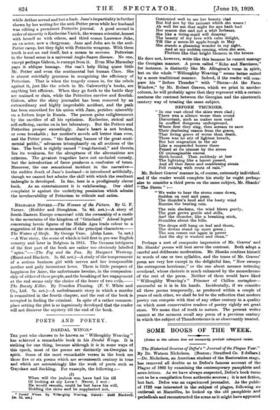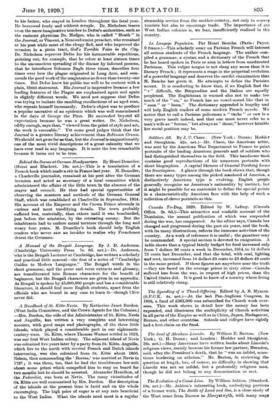SOME BOONS OF THE WEEK.
(Notice in this column does not neceesarily preclude subsequent rpvioo.
The friatorical Sources of Defog's" Journal of the Plague Year." By Dr. Watson Nicholson. (Boston: Stratford Co. 2 dollars.) —Dr. Nicholson, an American student of the Restoration stage, has removed all doubts as to Defoe's famous account of the Plague of 1665 by examining the contemporary pamphlets and news-letters. As we have always suspected, Defoe's book turns out to be a compilation from authentic souroes ; it is not fiction, but foot, Defoe was an experienced journalist. 48 the public of 1122 was interested in the subject of plague, following an outbreak at Morse/Ilea, he looked up the old pamphlets and periodicals and reconstructed the scene as it might have appeared to his father, who stayed in London throughout the fatal year. He borrowed freely and without scruple. Dr. Nicholson traces even the more imaginative' maginative touches to Defoe's a'utho'rities, such as the eminent physician Dr. Hodges, who is called " Heath " in the Journal, or Tmcent, a Nonconformist preacher, who remained at his post while most of the clergy fled, and who improved the occasion in a pious tract, God's Terrible Voice in the City. Dr. Nicholson reproves Defoe for his innumerable repetitions, pointing Out, for example, that he refers at least sixteen times to the unconscious spreading of the disease by infected persons, that he introduces Solomon Eagle three times, describes four times over how the plague originated in Long Acre, and com- mends the good work of the magistrates no fewer than twenty-one times. But Defoe knew his public too well to be content with a plain, blunt statement. His Journal is impressive because a few leading features of the Plague are emphasized again and again in slightly different Words. We need not suppose that Defoe was trying to imitate the rambling recollections of an aged man, who repeats himself incessantly. Defoe's object was to produce a popular narrative of an epidemic which was well remembered in the days of George the First. He succeeded beyond all expectation because he was a great writer. Dr. Nicholson, oddly enough, says that, " viewed from the point of style and art, the work is execrable." Yet some good judges think that the Journal is a greater literary achievement than Eobinson Crum& We should not goso faros that, but the Journal is-unquestionably one of the most vivid descriptions of -a-great calamity that we have ever read in any language. It is none the less remarkable because it turns out to be true.







































 Previous page
Previous page